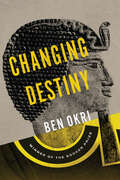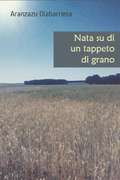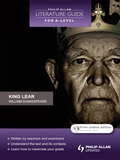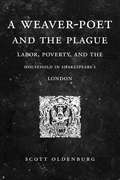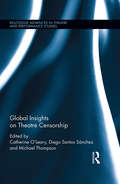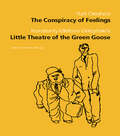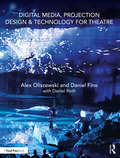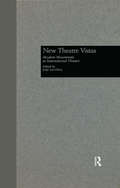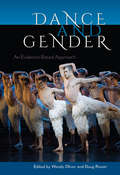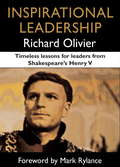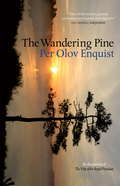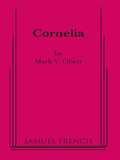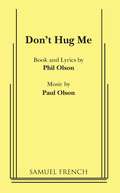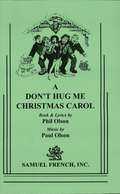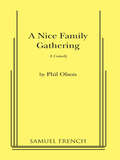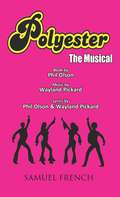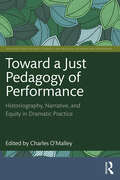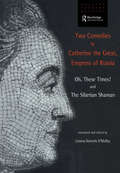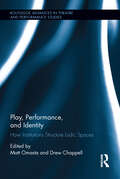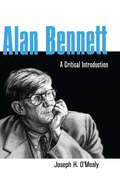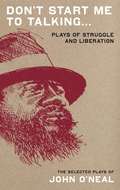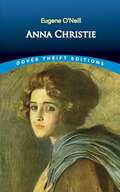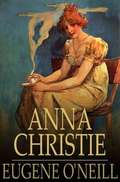- Table View
- List View
Changing Destiny
by Ben OkriA bold new adaptation of the 4,000-year-old Egyptian poem about Warrior King Sinuhe that captures the essence of civilization and the complexities of immigration, from the Booker Prize–winning author.Forced to flee Egypt, Sinuhe is captured as a prisoner of war by the foreign Kingdom of Retenu. Stripped of status and tormented by memories, Sinuhe will need great force of will to survive as a stranger in an unknown land. But can he transcend the mysterious powers of Egypt and the tribulations of exile?With two actors incarnating a multitude of characters, Ben Okri&’s play recreates one of the world&’s first known stories, a timeless tale about the strength of the human spirit.
Nata su di un tappeto di grano: .
by Aranzazu OlabarrietaQuesta storia narra della vita di una donna negli anni 20 in una impoverita Castiglia. Nonostante fosse nata al di fuori del matrimonio, ebbe un’infanzia felice estranea dalle chiacchiere, protetta da sua madre e un’adolescenza segnata da un amore proibito, vittima di un atto crudele che la segnerà per sempre. Conosce di nuovo l’amore e la vita torna a darle un duro colpo. Trascinandosi come molti altri nella miseria, si unisce all’esodo dalle campagne, emigrando ai Paesi Baschi con la sua famiglia dove tenta di ricominciare da capo, ma quando tutto sembra andare bene, le tocca lottare contro qualcosa più forte, il suo destino.
Philip Allan Literature Guide (for A-Level): King Lear
by Martin OldWritten by experienced A-level examiners and teachers who know exactly what students need to succeed, and edited by a chief examiner, Philip Allan Literature Guides (for A-level) are invaluable study companions with exam-specific advice to help you to get the grade you need.This full colour guide includes:- detailed scene summaries and sections on themes, characters, form, structure, language and contexts - a dedicated 'Working with the text' section on how to write about texts for coursework and controlled assessment and how to revise for exams - Taking it further boxes on related books, film adaptations and websites - Pause for thought boxes to get you thinking more widely about the text - Task boxes to test yourself on transformation, analysis, research and comparison activities - Top 10 quotesPLUS FREE REVISION RESOURCES at www.philipallan.co.uk/literatureguidesonline, including a glossary of literary terms and concepts, revision advice, sample essays with student answers and examiners comments, interactive questions, revision podcasts, flash cards and spider diagrams, links to unmissable websites, and answers to tasks set in the guide.
A Weaver-Poet and the Plague: Labor, Poverty, and the Household in Shakespeare’s London (Cultural Inquiries in English Literature, 1400–1700 #3)
by Scott OldenburgWilliam Muggins, an impoverished but highly literate weaver-poet, lived and wrote in London at the turn of the seventeenth century, when few of his contemporaries could even read. A Weaver-Poet and the Plague’s microhistorical approach uses Muggins’s life and writing, in which he articulates a radical vision of a commonwealth founded on labor and mutual aid, as a gateway into a broader narrative about London’s "middling sort" during the plague of 1603.In debt, in prison, and at odds with his livery company, Muggins was forced to move his family from the central London neighborhood called the Poultry to the far poorer and more densely populated parish of St. Olave’s in Southwark. It was here, confined to his home as that parish was devastated by the plague, that Muggins wrote his minor epic, London’s Mourning Garment, in 1603. The poem laments the loss of life and the suffering brought on by the plague but also reflects on the social and economic woes of the city, from the pains of motherhood and childrearing to anxieties about poverty, insurmountable debt, and a system that had failed London’s most vulnerable. Part literary criticism, part microhistory, this book reconstructs Muggins’s household, his reading, his professional and social networks, and his proximity to a culture of radical religion in Southwark.Featuring an appendix with a complete version of London’s Mourning Garment, this volume presents a street-level view of seventeenth-century London that gives agency and voice to a class that is often portrayed as passive and voiceless.
A Weaver-Poet and the Plague: Labor, Poverty, and the Household in Shakespeare’s London (Cultural Inquiries in English Literature, 1400–1700)
by Scott OldenburgWilliam Muggins, an impoverished but highly literate weaver-poet, lived and wrote in London at the turn of the seventeenth century, when few of his contemporaries could even read. A Weaver-Poet and the Plague’s microhistorical approach uses Muggins’s life and writing, in which he articulates a radical vision of a commonwealth founded on labor and mutual aid, as a gateway into a broader narrative about London’s “middling sort” during the plague of 1603.In debt, in prison, and at odds with his livery company, Muggins was forced to move his family from the central London neighborhood called the Poultry to the far poorer and more densely populated parish of St. Olave’s in Southwark. It was here, confined to his home as that parish was devastated by the plague, that Muggins wrote his minor epic, London’s Mourning Garment, in 1603. The poem laments the loss of life and the suffering brought on by the plague but also reflects on the social and economic woes of the city, from the pains of motherhood and childrearing to anxieties about poverty, insurmountable debt, and a system that had failed London’s most vulnerable. Part literary criticism, part microhistory, this book reconstructs Muggins’s household, his reading, his professional and social networks, and his proximity to a culture of radical religion in Southwark.Featuring an appendix with a complete version of London’s Mourning Garment, this volume presents a street-level view of seventeenth-century London that gives agency and voice to a class that is often portrayed as passive and voiceless.
Global Insights on Theatre Censorship (Routledge Advances in Theatre & Performance Studies)
by Catherine O'Leary Diego Santos Sánchez Michael ThompsonTheatre has always been subject to a wide range of social, political, moral, and doctrinal controls, with authorities and social groups imposing constraints on scripts, venues, staging, acting, and reception. Focusing on a range of countries and political regimes, this book examines the many forms that theatre censorship has taken in the 20th century and continues to take in the 21st, arguing that it remains a live issue in the contemporary world. The book re-examines assumptions about prohibition and state control, and offers a more complex reading of theatre censorship as a continuum ranging from the unconscious self-censorship built into social structures and discursive practices, through bureaucratic regulation or unofficial influence, up to detention and physical violence. An international team of contributors offers an illuminating set of case studies informed by both new archival research and the first-hand experience of playwrights and directors, covering theatre censorship in areas such as Spain, Portugal, Brazil, Poland, East Germany, Nepal, Zimbabwe, the USA, Ireland, and Britain. Focusing on right-wing dictatorships, post-colonial regimes, communist systems and Western democracies, the essays analyze methods and discourses of censorship, identify the multiple agents involved, examine the responses of theatremakers, and show how each example reveals important features of its political and cultural contexts. Expanding understanding of the nature and effects of censorship, this volume affirms the power of theatre to challenge authorized discourses and makes a timely contribution to debates about freedom of expression through performance.
The Conspiracy of Feelings and The Little Theatre of the Green Goose
by Yurii Olesha Konstanty Ildefons GałczyńskiTwo outstanding examples of socialist-themed plays are combined in this remarkable volume. The Conspiracy of Feelings by Yurii Olesha (1899-1960) is based on his highly respected short novel Envy about the struggle between the old and new in Soviet society. The play, called The Conspiracy of Feelings, is not a simple adaptation, but an original work that reconceived the novel. The play explores the precarious position of the intelligentsia in the new collective state. The Little Theatre of The Green Goose was written by Konstanty Ildefons Galczynski (1905-53) who was one of Poland's most beloved poets. After World War II, he began work as a playwright, inventing a colorful theatre troupe of performers (animal and human) and contributing a new instalment of The Little Theatre of the Green Goose each week to Przekroj, the Cracow literary magazine. Intended for reading only, The Green Goose went unperformed in Galczynski's life and was finally staged in 1955 and gained a permanent place in the theatre and became a force for the creation of the new Polish drama that flourished in the 1960s.
Digital Media, Projection Design, and Technology for Theatre
by Alex Oliszewski Daniel Fine Daniel RothDigital Media, Projection Design, and Technology for Theatre covers the foundational skills, best practices, and real-world considerations of integrating digital media and projections into theatre. The authors, professional designers and university professors of digital media in live performance, provide readers with a narrative overview of the professional field, including current industry standards and expectations for digital media/projection design, its related technologies and techniques. The book offers a practical taxonomy of what digital media is and how we create meaning through its use on the theatrical stage. The book outlines the digital media/projection designer’s workflow into nine unique phases. From the very first steps of landing the job, to reading and analyzing the script and creating content, all the way through to opening night and archiving a design. Detailed analysis, tips, case studies, and best practices for crafting a practical schedule and budget, to rehearsing with digital media, working with actors and directors, to creating a unified design for the stage with lighting, set, sound, costumes, and props is discussed. The fundamentals of content creation, detailing the basic building blocks of creating and executing digital content within a design is offered in context of the most commonly used content creation methods, including: photography and still images, video, animation, real-time effects, generative art, data, and interactive digital media. Standard professional industry equipment, including media servers, projectors, projection surfaces, emissive displays, cameras, sensors, etc. is detailed. The book also offers a breakdown of all key related technical tasks, such as converging, warping, and blending projectors, to calculating surface brightness/luminance, screen size and throw distance, to using masks, warping content and projection mapping, making this a complete guide to digital media and projection design today. An eResource page offers sample assets and interviews that link to current and relevant work of leading projection designers.
New Theatre Vistas: Modern Movements in International Literature (Studies in Modern Drama)
by Judy L. OlivaFirst Published in 1996. Part of a series of ‘Studies in Modern Drama’, Volume 7 This volume Studies in Modern Drama collects essays on contemporary theatre which reveal the changing face of the world, as well as challenges to the boundaries of traditional stage production. Authors examine familiar texts in new settings, discovering what editor Judy Lee Oliva calls “the effect of cultural- specific gestures, stances and the nuance of words,” so that audiences and critics are forced to recognize stereotypes and re-evaluate older critical methods. Topics range from directing gay and working-class theatre in Scotland to producing American and British drama in Holland, Belgium, and Poland. New voices in the theatre are heard, and old ones are put to new tests. What remains is the power of performance to inspire emotional and intellectual response. Writers, directors, costume designers, producers, and critics provide an uncommon range of perspectives to the changing roles of theatre in an increasingly global community.
Dance and Gender: An Evidence-Based Approach
by Wendy Oliver Doug RisnerDriven by exacting methods and hard data, this volume reveals gender dynamics within the dance world in the twenty-first century. It provides concrete evidence about how gender impacts the daily lives of dancers, choreographers, directors, educators, and students through surveys, interviews, analyses of data from institutional sources, and action research studies. Dancers, dance artists, and dance scholars from the United States, Australia, and Canada discuss equity in three areas: concert dance, the studio, and higher education. The chapters provide evidence of bias, stereotyping, and other behaviors that are often invisible to those involved, as well as to audiences. The contributors answer incisive questions about the role of gender in various aspects of the field, including physical expression and body image, classroom experiences and pedagogy, and performance and funding opportunities. The findings reveal how inequitable practices combined with societal pressures can create environments that hinder health, happiness, and success. At the same time, they highlight the individuals working to eliminate discrimination and open up new possibilities for expression and achievement in studios, choreography, performance venues, and institutions of higher education. The dance community can strive to eliminate discrimination, but first it must understand the status quo for gender in the dance world. Wendy Oliver, professor of dance at Providence College, is coeditor of Jazz Dance: A History of the Roots and Branches. Doug Risner, professor of dance at Wayne State University, is coeditor of Hybrid Lives of Teaching Artists in Dance and Theatre Arts: A Critical Reader. Contributors: Gareth Belling | Karen Bond | Carolyn Hebert | Eliza Larson | Pamela S. Musil | Wendy Oliver | Katherine Polasek | Doug Risner | Emily Roper | Karen Schupp | Jan Van Dyke
Inspirational Leadership: Timeless Lessons for Leaders from Shakespeare's Henry V
by Richard OlivierHenry V is Shakespeare's greatest leader inspired and inspiring, visionary yet pragmatic, powerful yet responsible. As a study of an inspirational leader he remains unparalleled. As a new king, Henry unites a group of disparate people around a common goal, learns to face his own self-doubts, and inspires his followers to a near-miraculous victory against all odds. It s an allegory for the trials and tribulations that beset the modern business leader. In this fascinating book, acclaimed stage director and creative consultant Richard Olivier draws on his intimate knowledge of the play, and its absorbing central character, to unmask the secrets of inspirational leadership and reveal the timeless lessons it hold for managers and leaders today. With unique practical understanding gained from working with real-life managers and leaders on this seminal text, Olivier successfully combines ancient wisdom with modern experience. Following the journey of the play, he tracks the development of Henry as a leader, offering timeless insights into the psychology, skills and techniques of effective, inspirational leadership.
Inspirational Leadership
by Richard OlivierHenry V is Shakespeare's greatest leader - inspired and inspiring, visionary yet pragmatic, powerful yet responsible. Of all Shakespeare's stories, it offers us the deepest insights into the nature of inspiration. A new king unites a group of disparate and warring people around a common goal, overcoming all obstacles in his path on the way to achieving a near miraculous victory against all odds. It's an allegory for the trials and tribulations that beset the modern business leader. In this fascinating book, acclaimed stage director and creative consultant Richard Olivier draws on his intimate knowledge of Shakespeare's play, Henry V, and its absorbing central character, to unmask the secrets of inspirational leadership and reveal the timeless lessons it hold for managers and leaders today.
The Wandering Pine: Life as a Novel
by Per Olov EnquistWhen everything began so well, how could it turn out so badly? A blisteringly frank autobiographical novel by Sweden's great man of letters - for readers of K. O. Knausgaard's My Struggle."Some life. Some novel . . . Wonderful, brave, evocative . . . It is a remarkable story, and Enquist is remarkably frank in narrating every last detail" HeraldWhat was it about Hjoggböle, a farming village in the northernmost part of Sweden, that created so many idiots - and writers? There was nothing to indicate that P.O. Enquist would be stricken by an addiction to writing. Nothing in his family - honest, hardworking people. Not a trace of poetry. And yet he worked his way, via journalism, novels and plays, to the centre of Swedish politics and cultural life. His books garnered prize after prize. His plays ran for decades and premiered on Broadway. Why then, living with a new wife in Paris, does he hole up in their palatial Champes-Élysées apartment, talking only to his cat? How is it that he wakes to find himself in an uncoupled carriage on a railway siding in Hamburg, two - or was it three? - days after the first-night party finished? And what is it that drives him to run shoeless through the deep January snow of an Icelandic plain, leaving the lights of the drying out clinic far behind? Narrating in the third person, as if he were merely a character in the eventful, perplexing and ultimately triumphantly redemptive drama of his own life, P.O. Enquist is as elliptical as Karl Ove Knausgaard is exhaustive. Clear-eyed, rueful, written with elegance and humour, this is the singular story of a remarkable man.
Cornelia
by Mark V. OlsenCharacters: 2m, 3f /Dramatic Comedy From the co-creator of the hit HBO series 'Big Love' comes an epic slice of history centering on 1970s Alabama politics. Beautiful, divorced beauty queen Cornelia Folsom is a force of nature who works her way into the heart of Governor George Wallace. Together they plan to take over the state and then the White House until an assassination attempt halts his presidential campaign. But no obstacle is too great for Cornelia to overcome, as she secretly harbors her own political ambitions amidst a hostile campaign staff, her rarely sober mother, and Southern shenanigans in this sweeping, provocative tale of sex, power, and bare-knuckled American politics
Don't Hug Me
by Phil OlsonMusical Comedy / 3m, 2f / It's Fargo meets The Music Man (without the blood or the trombones). Oh, for cryin’ in yer snow shoes! It’s the coldest day of the year in Bunyan Bay when a slick karaoke salesman arrives at the bar and turns the locals’ lives upside down. With its over the top songs and crazy characters, this “Minnesota love story with singin’ and stuff” will have you laughing until the spring thaw! Don't Hug Me takes place in Bunyan Bay, Minnesota. Cantankerous bar owner, Gunner Johnson, wants to sell the business and move to Florida. Clara, his wife and former Winter Carnival Bunyan Queen, wants to stay. Bernice Lundstrom, the pretty waitress, wants to pursue a singing career. Her fiance, Kanute Gunderson, wants her to stay home. It's a battle of wills, and when a fast-talking salesman, Aarvid Gisselsen, promises to bring romance into their lives through the 'magic' of karaoke, all heck breaks loose!
A Don't Hug Me Christmas Carol
by Phil OlsonMusical Comedy / 3m, 2f / Interior / Oh, for cryin’ in yer snow shoes! It’s the coldest day of the year in Bunyan Bay when a slick karaoke salesman arrives at the bar and turns the locals’ lives upside down. With its over the top songs and crazy characters, this “Minnesota love story with singin’ and stuff” will have you laughing until the spring thaw! Don't Hug Me takes place in Bunyan Bay, Minnesota. Cantankerous bar owner, Gunner Johnson, wants to sell the business and move to Florida. Clara, his wife and former Winter Carnival Bunyan Queen, wants to stay. Bernice Lundstrom, the pretty waitress, wants to pursue a singing career. Her fiance, Kanute Gunderson, wants her to stay home. It's a battle of wills, and when a fast-talking salesman, Aarvid Gisselsen, promises to bring romance into their lives through the 'magic' of karaoke, all heck breaks loose!
A Nice Family Gathering
by Phil OlsonComedy / Winner of the 2000 Rochester Playwright Festival / 4m, 3f / Interior Set / A NICE FAMILY GATHERING is a story about a man who loved his wife so much, he almost told her. It's Thanksgiving Day and the first family gathering at the Lundeen household since the Patriarch died. At the gathering, Dad comes back as a ghost with a mission; to tell his wife he loved her, something he neglected to tell her while he was alive. After all, they were only married for 41 years. The problem is, she can't hear or see him. The trouble begins when Mom invites a date for dinner. / "Hilarious and touching!" - LA Weekly Pick of the Week.
Polyester the Musical
by Phil OlsonMusical Comedy / Characters: 3m, 2f The story of The Synchronistics, an over-the-hill ABBA wannabe group that reunites after 20 years to perform at a public access TV telethon, put their differences aside, and try to save the station from going under. The year was 1979 and The Synchronistics were big. Big enough to be on Johnny Carson. Their hit single, "Better Together" rose to number two on the Billboard Charts. Then something terrible happened that drove the group apart. And now, 20 years later, they're back together in Maple Valley, their home town, to perform at the 1999 WKLN public access TV Telethon. Will they overcome their differences from 20 years ago, act professionally and help save WKLN from going under? Probably not. But you never know what to expect when this dysfunctional group gets together...one last time. It's "Mamma Mia" meets "Spinal Tap" Featuring 16 original songs including "The Funk Train" and "Bump Your Booty Rump." "Be sure to check out this toe-tapping, hilarious journey back to your "Dancing Queen" days!...This show will take you back to the 70's, and you'll hardly be able to control your urge to get up on stage and do "The Funk Train!" - Actors Entertainment "Audience members laughed uncontrollably throughout!...Energetically entertaining!...A rollicking good time!" - The Tolucan Times"I loved it!" - Fred Willard "It's great fun!"- BroadwayWorld.com "A fun and entertaining evening with the audience moving and grooving to the sounds of the 70's style original music and contagious dancing in their seats. It's fun, fun, fun all the way through!...You will have a ball! It's the perfect show to pick up your spirits!"- NoHoArtsDistrict.com
Toward A Just Pedagogy Of Performance: Historiography, Narrative, And Equity In Dramatic Practice (Routledge Series in Equity, Diversity, and Inclusion in Theatre and Performance)
by Charles O’MalleyThis book is a compendium of resources largely by and for artists and scholars interested in engaging in conversations of justice, diversity, and historiography in the fields of theatre and performance studies. For these students, and for the future instructors in our field who will use this book, we hold a tripartite hope: to expand, to enable, and to provide access. In its whole, we intend for this book to provoke its readers to question the narratives of history that they’ve received (and that they may promulgate) in their artistic and scholarly work. We aim to question methods and ethics of reading present in the western mode of studying drama and performance history. The contributions in the book—not traditional chapters, but manifestos, experiences, articles, conversations, and provocations—raise questions and illuminate gaps, and they do not speak in a unified voice or from a static position. These pieces are written by artists, graduate students, teachers, administrators, and undergraduates; these are expressions of hope and of experience, and not of dogma. This book is aimed toward instructors of undergraduates, both graduate students and faculty at all levels of seniority within theatre and performance studies, as well as at artists and practitioners of the art that wish to find more just ways of viewing history.
Two Comedies by Catherine the Great, Empress of Russia: Oh, These Times! and The Siberian Shaman
by Lurana Donnels O'MalleyCatherine the Great (1729-1796) wrote over two dozen plays and operettas, but not until this edition has a complete translation of any of them been available to an English- speaking readership. Oh, These Times (1772) is a satirical attack on many vices Catherine wished to root out from her society: religious hypocrisy, superstition and slander. The main character, Mrs. Pious, is a superficially religious old woman who resembles Moliere's Tartuffe. Catherine again sets her sights on superstition in The Siberian Shaman (1786), this time by satirizing shamanism as a deceitful profession which preys on the gullible. This play was part of a group of three plays usually known as Catherine's "anti-masonic" trilogy, written as a warning against the growing influence of the freemasons. In a comprehensive introduction, Lurana Donnels O'Malley relates the plays to Catherine's status and philosophy.
Play, Performance, and Identity: How Institutions Structure Ludic Spaces (Routledge Advances in Theatre & Performance Studies)
by Matt Omasta Drew ChappellPlay helps define who we are as human beings. However, many of the leisurely/ludic activities people participate in are created and governed by corporate entities with social, political, and business agendas. As such, it is critical that scholars understand and explicate the ideological underpinnings of played-through experiences and how they affect the player/performers who engage in them. This book explores how people play and why their play matters, with a particular interest in how ludic experiences are often constructed and controlled by the interests of institutions, including corporations, non-profit organizations, government agencies, religious organizations, and non-governmental organizations (NGOs). Each chapter explores diverse sites of play. From theme parks to comic conventions to massively-multiplayer online games, they probe what roles the designers of these experiences construct for players, and how such play might affect participants' identities and ideologies. Scholars of performance studies, leisure studies, media studies and sociology will find this book an essential reference when studying facets of play.
Alan Bennett: A Critical Introduction (Studies in Modern Drama)
by Joseph O'MealyAlan Bennett is perhaps best known in the UK for the BBC production of his Talking Heads TV plays, while the rest of the world may recognize him for the film adaptation of his play, The Madness of King George. O'Mealy points out that Bennett is a social critic strongly influenced by Beckett and Swift, interested in depicting and analyzing the role playing of everyday life, a'la sociologist Ervin Goffman.
Don't Start Me To Talking . . .: The Selected Plays
by John O'Neal"Nearly five decades of on-the-job training have equipped O'Neal with the skills and charm of a master storyteller."--The Drama Review "A dramatic tale spinner with a canny sense of humor and a winning, engaging stage presence. . . . O'Neal's shows mix folksiness, a sophisticated sense of theatricality and astute observation that are a pleasure to watch."--The Philadelphia Inquirer Artist and activist John M. O'Neal is best known for his Junebug Jabbo Jones cycle of plays, a remarkable collection of tales and anecdotes drawn from African American oral literature, which he has performed all over the globe. Four of these plays are included in this volume, along with four of O'Neal's other works: large-scale ensemble productions, first performed by his ensemble company Junebug Productions, as well as in collaboration with A Travelling Jewish Theater (San Francisco, California), Roadside Theater (Kentucky), and Pregones Theater (Bronx, New York). John M. O'Neal co-founded the Free Southern Theater in 1963 as a cultural arm of the southern Civil Rights movement, as well as Junebug Productions, a professional African American arts organization in New Orleans. For FST, O'Neal worked as a field director for the Student Non-Violent Coordinating Committee and worked as national field program director with the Committee for Racial Justice. He has written eighteen plays, a musical comedy, poetry, and several essays, and has performed throughout the United States, Canada, France, and Scandinavia. He is the recipient of the Award of Merit from the Association of Performing Arts Presenters, the United States Artists Award, and a Ford Foundation Award.
Anna Christie (Dover Thrift Editions)
by Eugene O'NeillEarly in his career, Eugene O'Neill (1888-1953) wrote a series of plays revolving around characters obsessed with the sea. This period culminated in the 1922 production of Anna Christie, a drama of social realism that was among the first of the author's plays to explore characters searching for their own identities. Centering on the reunion of a barge captain and his daughter after a twenty-year separation, the play derives its tension from the former's disaffection for the seafaring life and the latter's love for a sailor. The father-daughter conflict elicits a shocking confession, which illuminates the author's contention that character is fate and the seemingly external forces controlling destiny actually lie within<P><P> .Anna Christie amply displays O'Neill's extraordinary insights into character and his masterly use of language, qualities that have earned him acclaim as one of America's greatest playwrights. Students and lovers of modern theater will prize this inexpensive edition of his landmark drama.<P> Pulitzer Prize Winner
Anna Christie
by Eugene O'NeillEarly in his career, Eugene O'Neill (1888-1953) wrote a series of plays revolving around characters obsessed with the sea. This period culminated in the 1922 production of Anna Christie, a drama of social realism that was among the first of the author's plays to explore characters searching for their own identities. Centering on the reunion of a barge captain and his daughter after a twenty-year separation, the play derives its tension from the former's disaffection for the seafaring life and the latter's love for a sailor. The father-daughter conflict elicits a shocking confession, which illuminates the author's contention that character is fate and the seemingly external forces controlling destiny actually lie within<P><P> .Anna Christie amply displays O'Neill's extraordinary insights into character and his masterly use of language, qualities that have earned him acclaim as one of America's greatest playwrights. Students and lovers of modern theater will prize this inexpensive edition of his landmark drama.<P> Pulitzer Prize Winner
